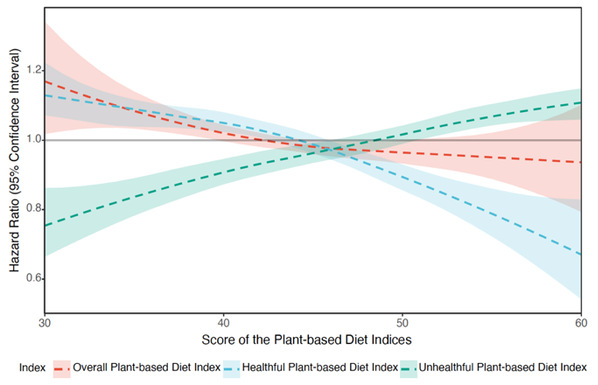A plant-based dietary pattern is usually defined as a diet rich in plant-based foods and low level of animal-based foods, and has received accumulating attention for its potential health and environmental benefits. However, not all plant-based foods are necessarily beneficial to health, and most prior studies focused only on the western population, while there is limited evidence for the East Asian population who has a tradition of plant-based diet.
On March 7, 2022, the research team led by Dr. YUAN Changzheng from the Zhejiang University School of Medicine and Dr. WANG Xiaoxi from the Zhejiang University School of Public Affairs published a study entitled “Plant-based dietary patterns in relation to mortality among older adults in China” in Nature Aging.

Figure. Scores of plant-based diet indices in relation to risk of all-cause mortality in Chinese older adults
This study investigated the associations of overall plant-based dietary patterns, as well as healthful and unhealthful plant-based dietary patterns, with mortality based on a nationwide cohort of 13,154 older adults in China from 2008 to 2018. The researchers discovered that an overall plant-based dietary pattern and a plant-based dietary pattern emphasizing more healthful plant-based foods, such as legumes and fresh vegetables, were associated with a lower risk of mortality, while a plant-based dietary pattern rich in unhealthful plant-based foods, such as preserved vegetables and sugar, showed a relation to a higher mortality risk. The findings suggest that not only quantity, but quality of plant-based foods should be emphasized in future dietary recommendations for Chinese older adults.
“Diet is closely related to human health. We hope that our research will provide evidence for future dietary recommendations, and we plan to further assess the benefits for health and environment brought about by gradually adopting a healthful plant-based dietary pattern”, says Dr. Yuan and Dr. Wang.
Source:YUAN Changzheng's Lab